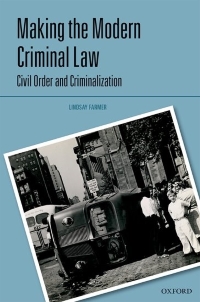Criminalisation and the Criminal law
With an emphasis on interdisciplinarity, this streamfocuses on the principles and goals that should guide decisions about what kinds of conduct should be criminalized, and the forms that criminalization should take. The overall aim is to develop a normative theory of criminalization. Running parallel to this, an interest in what principles and goals should guide criminal law-making (what should be criminalised and under what conditions?) informs a key research interest around the history and genealogy of Criminal Law.
Projects
Making the Modern Criminal Law
 |
The research for the book grew out of the four year AHRC funded interdisciplinary project on criminalization, focusing on the principles that might guide decisions about what kinds of conduct should be criminalized, and the forms that criminalization should take. This project aimed to tackle key questions about how the law was made and enforced: what principles and goals should guide legislators in deciding what to criminalize? How should criminal wrongs be classified and differentiated? How should law enforcement officials apply the law's specifications of offences? In the book I go further, looking at the development of the institutional conditions that underpin and make possible our contemporary understanding of criminalization. This is a matter of placing the emergence of contemporary understandings of the ‘criminalization question’ in an account of the development of the modern institution of criminal law.
The book offers a historical and conceptual account of the development of the modern criminal law in England and as it has spread to common law jurisdictions around the world. It gives a historical perspective on the development of theories of criminalization. It shows how the emergence of theories of criminalization is inextricably linked to modern understandings of the criminal law as a conceptually distinct body of rules, and how this in turn has been shaped by the changing functions of criminal law as an instrument of government in the modern state. It is structured in two main parts. The first traces the development of the modern law as a distinct, and conceptually distinct body of rules, looking in particular at ideas of jurisdiction, codification and responsibility. The second part then engages in detailed analysis of specific areas of criminal law, focusing on patterns of criminalization in relation to property, the person, and sexual conduct.
Criminalisation 2008-12
This was a four year project (2008-2012) funded by the Arts and Humanities Research Council (grant no 128737). Lindsay Farmer (University of Glasgow) collaborated with Antony Duff and Sandra Marshall (both Philosophy, University of Stirling), and Massimo Renzo and Victor Tadros (Philosophy and Law, University of Warwick). The question that we set ourselves was to try and answer the question of what should be criminalised, or what is the proper scope of the criminal law.
We organised a series of meetings and workshops on different aspects of this question, involving lawyers, philosophers, criminologist and historians, amongst others, looking at questions such as what principles and goals should legislatures use in deciding what to criminalize? How should criminal wrongs be classified and differentiated? And how should law enforcement officials apply the law?
This project has led to the publication of four volumes edited by the research team:
- The Boundaries of the Criminal Law (Oxford, 2012)
- The Structures of the Criminal Law (Oxford, 2013)
- The Constitution of the Criminal Law (Oxford, 2014)
- Criminalization: the Political Morality of the Criminal Law (Oxford 2014)

